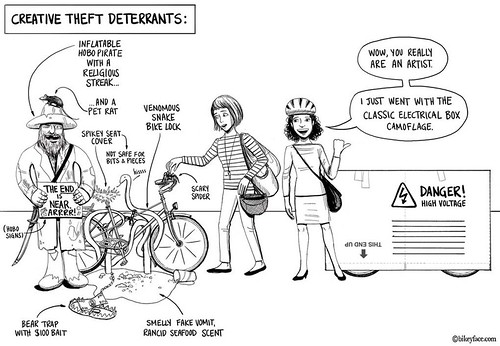 |
| My Cannondale had Avid BB7s, too. Was it the snazzy disc brakes that caught the thief's fancy? |
- How a bike thief locks a bike: If anyone knows how to secure a bike, it ought to be a bike thief, right? So how does a bike thief—currently active or reformed, I don't care—lock a bike? Well, here's what Omar Aziz does. (Omar is a onetime crack addict and bike thief who spoke to Guardian blogger Frederika Whitehead.) He uses two thick chains, through both wheels and the frame. Such chains can be cut, but it takes time and equipment thieves may not have.
- Never say "I'll come back for it later": Back during his thieving days, if Omar Aziz wanted a bike that was locked on a street too busy for him to be comfortable stealing it when he spotted it, he would puncture the tire to increase the chances of the bike's owner leaving it there longer—maybe even overnight. He told Whitehead: "Someone, if they find their tyre punctured they should take their bike with them, right at that minute because someone has done it on purpose to come and take it after."
- The Big Apple Is in a Class by Itself: Maybe everyone but me knew this already, but I read in this rather odd one-pager that Kryptonite lock warranties are void in New York City. (I will verify this claim and give the lowdown on lock warranties more generally in a future post.)
- Yes, David, There Is a Threat from Freezing: This one's for you commenter David. As The Dependent Magazine of Vancouver reports (in what is probably the best instance of the interview-with-a-bike-thief genre I came across): "Beyond bolt cutters and cordless grinders, thieves employ a number of techniques to relieve people of their beloved bicycles. Butane canisters are sprayed into cheap, aluminum locking mechanisms, freezing the components so they can be smashed with a hammer." (I also learned from "Ryan," the thief who informed the Dependent piece, that (1) "nothing" is safe when a thief is equipped with a $200 cordless grinder and (2) "good disc brakes" rank high on the list of attractive components.)
- There's an Arms Race On: Want an uplifting story of a onetime bike thief who "turned his back on crime after completing a bicycle mechanic course"? Click here. What I got from Shaddouh's tale of redemption is confirmation that those keen to steal bikes pay close attention to what those keen to hold onto them are up to. As Shaddouh told The Docklands & East London Advertiser: "When we had a bit of extra money we would buy a really expensive lock to take apart and research how we could break it for future jobs." I guess that means the current crop of bike thieves is hard at work figuring out how to best tackle the TiGr...









